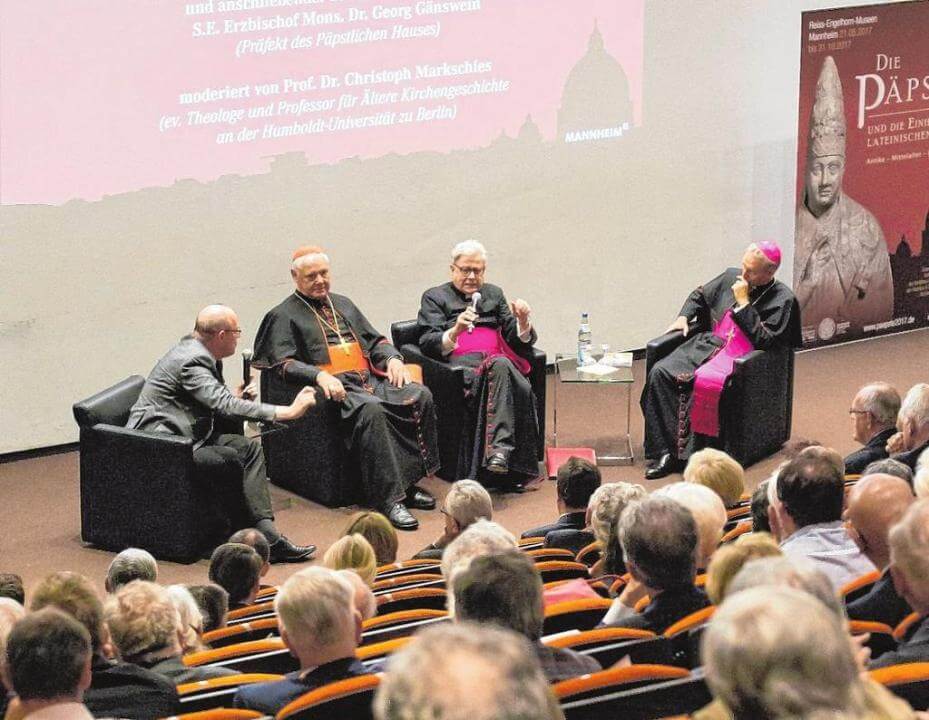Image via Die Tagespost
Gloria von Thurn und Taxis, a prominent Catholic German princess who is very supportive of orthodox Catholic causes in Germany, has just last Friday welcomed Cardinal Gerhard Müller – the former Prefect of the Congregation for the Doctrine of the Faith – at the Reiss-Engelhorn-Museen in Mannheim, Germany, for the occasion of a public presentation of his new book on the papacy (The Pope – Mission and Mandate). Archbishop Georg Gänswein, as well as Prelate Wilhelm Imkamp – the director of the pilgrimage site Maria Vesperbild (Augsburg) – both also participated in this book presentation which took the form of a public discussion which was moderated by the Protestant Church historian, Christoph Markschies.
During this session, Cardinal Müller, according to reports published by the Catholic newspaper Die Tagespost, as well as by the German digital newspaper Mannheimer Morgen, made some helpful and encouraging statements with regard to the current situation in the Catholic Church. First of all, when speaking about the papacy, the German cardinal made it clear that a deep and disciplined “theological competence” has to be the foundation for “magisterial authority.” A fruitful relationship between Magisterium and theology is dependent upon a good formation. As Die Tagespost sums up his words, as follows:
To rely solely upon the inspiration by the Holy Ghost in theological questions? A frightening idea for the professor-dogmatician [Müller]. Müller makes reference here to the example of Saint Robert Bellarmine (1542-1621); he pointed out to Clement VIII (1536-1605) in clear words his lack of theological competence.
According to the Mannheimer Morgen, Müller quoted St. Robert Bellarmine’s own words, “You have no idea about that!” — which he had once firmly expressed to the pope. The newspaper continues, saying: “That was a long time ago. But Cardinal Gerhard Ludwig Müller explicitly named him as his model, and with joy he quoted exactly that sentence.” The newspaper also indicates that it was clear to them that the wound of Müller’s recent dismissal “is still deep, very deep.”
As the Mannheimer Morgen reports it, Cardinal Müller had some strong criticism concerning the current state of affairs in the Vatican:
Instead of the Congregation [for Doctrine], the Vatican’s Secretariat of State is now considered to be the most important institution. “Diplomacy and power questions now have priority, that is a wrong crucial development which needs to be corrected.” It should be rather the Christian belief which should be at the center, and the pope should merely be a “servant of salvation.”
As an example, Cardinal Müller named the recent visit of Cardinal Pietro Parolin to Moscow and the public impression it made: the images of Parolin with Putin and with Patriarch Kyrill are giving in Müller’s eyes a “fatal optic, because one can fall here into the trap of thinking that religion and politics are one unit.” In the words of Die Tagespost, Müller pointed out:
It never worked out when the Church’s mission was circling around [and concentrating on] power. “The center of the papacy is not the pope himself, but the Christian Faith.” He [Müller] himself would wish for “a clearer theological preparation of [official] documents.”
Archbishop Gänswein, Prefect of the Papal Household, also spoke during this public discussion. He did not seem to object at all to any of Cardinal Müller’s polite but firm criticism. As the Mannheimer Morgen puts it: “From him [Gänswein], there came neither a critique of Müller, nor a distancing.” According to the Tagespost, Gänswein said: “I do not see that Catholics have fallen away from unity with the pope. If cardinals criticize papal statements and conduct – what is so bad about that?” He also pointed out that the pope himself has invited free speech. “That one cardinal or another is of another opinion, the papal office has to endure,” in the summarizing words of the Tagespost. Gänswein also added that, throughout the history of the Church, cardinals have sometimes harshly criticized popes. He said:
I do not see this as a criticism of the papal office, but a critique of certain statements which possibly have been misunderstood by persons – also outside of the Church.
These words coming from the man who also serves as the personal secretary of Pope emeritus Benedict XVI could very well also now be read in the context of the recent dismissal of Professor Josef Seifert by his archbishop in Granada, Spain, with the explicit disapproving reference to Seifert’s polite critique of Amoris Laetitia, but also in the context of the four dubia cardinals and their own polite and direct questions to the pope.
In a similar vein, Prelate Imkamp, himself a learned historian – he had worked for a while for then-Professor Walter Brandmüller at the University of Augsburg – also made some helpful comments. That is to say, he himself highly values Catholic debates among high-ranking prelates, according to the Tagespost:
The College of Cardinals is not a [Communist] Political Office, but the “most beautiful example for the functioning synodal principle in the Catholic Church.” It has always been the “privileged place of disagreement”: “The cardinals always challenged each and every pope.” In all of the pontificates in the last 500 years, there was to be seen individual cardinals who had disputes – some of them intense ones – among each other.
May we dare to see here the first signs of a polite and principled defense of the four dubia cardinals – and also some support for Cardinal Müller himself – as well as for those laymen who have raised serious questions concerning the papacy of Pope Francis? And may we dare to see here also the first signs of a growing conviction and courage in Cardinal Müller himself to speak up where his office as cardinal calls him to defend the Catholic Faith?


